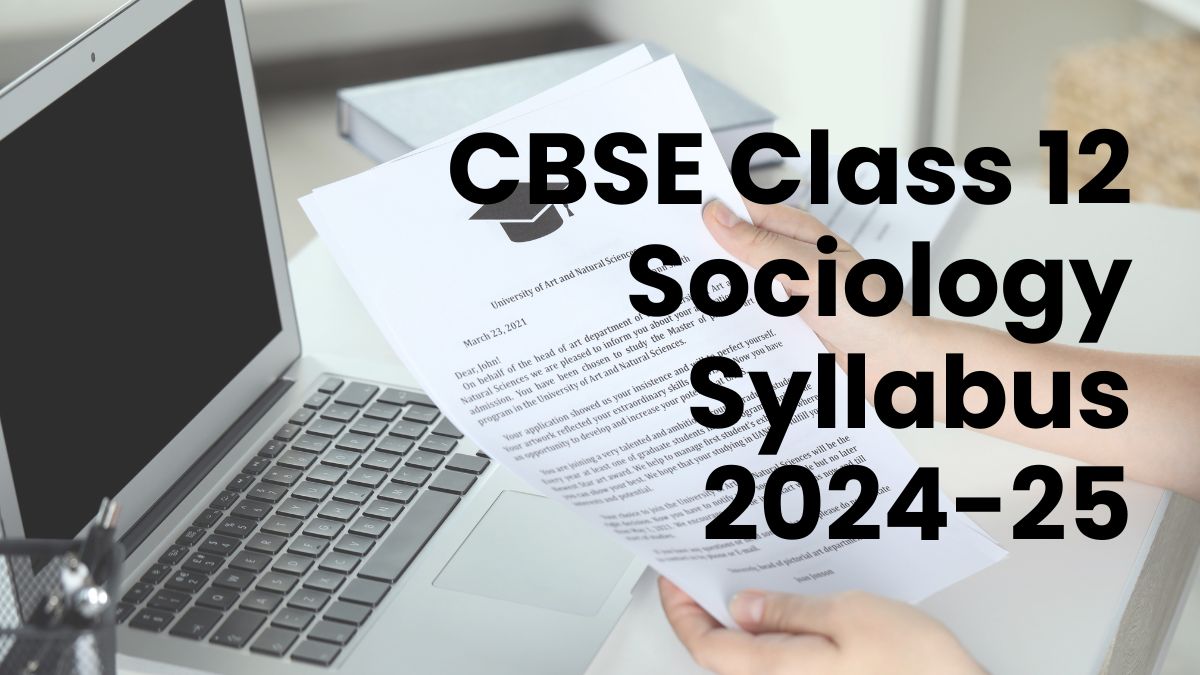CBSE Class 12 Sociology Syllabus 2024-25
Students can now download the PDF of the syllabus from the official CBSE website. The PDF provides all the details about the topics to be studied, the number of periods allocated for each unit, and the marks distribution. This will help students plan their studies more effectively and focus on important areas for their exams. It’s important for students to go through the syllabus carefully to understand the course structure and prepare accordingly for the upcoming academic year.
Units, Periods and Marks Breakdown
| Units | No. of Periods | Marks |
|---|---|---|
| A. Indian Society | 40 Marks | |
| 1. Introducing Indian Society | 0 (Non-evaluative) | 0 |
| 2. The Demographic Structure of Indian Society | 10 | 10 |
| 3. Social Institutions: Continuity and Change | 12 | 10 |
| 5. Patterns of Social Inequality and Exclusion | 18 | 10 |
| 6. The Challenges of Cultural Diversity | 22 | 10 |
| 7. Suggestions for Project Work | 10 (Non-evaluative) | 0 |
| B. Social Change and Development in India | 40 Marks | |
| 8. Structural Change | 8 | 5 |
| 9. Cultural Change | 12 | 5 |
| 11. Change and Development in Rural Society | 10 | 10 |
| 12. Change and Development in Industrial Society | 12 | 10 |
| 15. Social Movements | 18 | 10 |
| Total | 132 | 80 Marks |
Detailed Course Content
A. Indian Society (40 Marks)
Unit 1: Introducing Indian Society
- Colonialism, Nationalism, Class, and Community (Non-evaluative)
- 0 Periods
Unit 2: The Demographic Structure of Indian Society
- Theories and Concepts in Demography
- Rural-Urban Linkages and Divisions
- Population Policy in India
- 10 Periods
Unit 3: Social Institutions: Continuity and Change
- Caste and the Caste System
- Tribal Communities
- Family and Kinship
- 12 Periods
Unit 5: Patterns of Social Inequality and Exclusion
- Social Inequality and Social Exclusion
- Systems Justifying and Perpetuating Inequality: Caste, Tribe, and Other Backward Classes
- Adivasi Struggles
- The Struggle for Women’s Equality and Rights
- Struggles of the Differently Abled
- 18 Periods
Unit 6: The Challenges of Cultural Diversity
- Cultural Communities and the Nation-State
- Regionalism in the Indian Context
- The Nation-State and Religion-related Issues and Identities
- Communalism, Secularism, and the Nation-State
- State and Civil Society
- 22 Periods
Unit 7: Suggestions for Project Work
- 10 Periods (Non-evaluative)
B. Social Change and Development in India (40 Marks)
Unit 8: Structural Change
- Understanding Colonialism, Industrialization, Urbanization
- 8 Periods
Unit 9: Cultural Change
- Social Reform Movements
- Different Kinds of Social Change: Sanskritization, Westernization, Modernization, Secularization
- 12 Periods
Unit 11: Change and Development in Rural Society
- Agrarian Structure: Caste and Class in Rural India
- Land Reforms, Green Revolution, and Emerging Agrarian Society
- Green Revolution and its Social Consequences
- Transformation in Rural Society
- Circulation of Labor
- Globalization, Liberalization, and Rural Society
- 10 Periods
Unit 12: Change and Development in Industrial Society
- From Planned Industrialization to Liberalization
- How People Find Jobs
- Work Processes: Working Conditions, Home-Based Work, Strikes, and Unions
- 12 Periods
Unit 15: Social Movements
- Concept of Social Movements
- Theories and Classification of Social Movements
- Environmental Movements
- Class-Based Movements: Workers, Peasants
- Caste-Based Movements: Dalit Movement, Backward Class/Castes, and Trends in Upper Caste Responses
- Tribal Movements
- Women’s Movements in Independent India
- 18 Periods
Project Work
| Components | Marks |
|---|---|
| 1. Introduction | 2 |
| 2. Statement of Purpose | 2 |
| 3. Research Question | 2 |
| 4. Methodology | 3 |
| 5. Data Analysis | 4 |
| 6. Conclusion | 2 |
| Total Marks for Project | 15 |
| Viva Based on Project | 5 |
| Total Marks for Project & Viva | 20 |
Question Paper Design
| Competencies | Marks | Weightage (%) |
|---|---|---|
| 1. Knowledge & Understanding: Recall facts, terms, basic concepts, and ideas. Organize and interpret information. | 30 | 37.5% |
| 2. Application of Knowledge & Concepts: Solve problems by applying learned material, identify causes and motives, defend opinions with evidence. | 32 | 40% |
| 3. Formulation, Analysis, Evaluation & Creation: Combine elements in new ways to propose solutions. | 18 | 22.5% |
| Total | 80 | 100% |
CBSE Class 12 Sociology Syllabus 2024-25 PDF Download
You can download the PDF of the CBSE Class 12 Sociology Syllabus 2024-25 from the official CBSE website or by clicking the link below to get the latest and correct information for your studies.
CBSE Class 12 Sociology Syllabus 2024-25-Click Here To Download PDF
Related Articles:

